

C3S Edu Demo. Home. The INDCs and climate impacts -AVOID 2 climate change research programme. How every part of the world has warmed – and could continue to warm. INFOGRAPHICS | September 26. 2018. 15:10.

How every part of the world has warmed – and could continue to warm. Ryan Air - Greenwashing. Climate Change Negotiations For Schools - Metlink Teaching Weather and Climate. Guidance for Teachers Notes for teachers – this contains everything you need to know to run the activity.
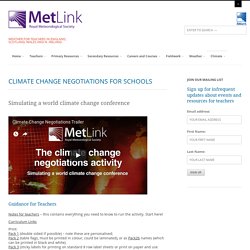
Start here! Curriculum LinksPrint:Pack 1 (double sided if possible) – note these are personalised;Pack 2 (table flags, must be printed in colour, could be laminated), or as Pack2b names (which can be printed in black and white).Pack 3 (sticky labels for printing on standard 8 row label sheets or print on paper and use school lanyards), Optional Pack 4 (country fact sheets for reference in class),Pack 5 for Module 4, Market Places.PowerPoint slides for use in all modules. Edit this before use to assign students to each country. Please let us know if you have used these resources by emailing education@rmets.org. Module 1 – Introduction Powtoon introduction or non flash version. Climate Change Science. Science Bulletins: The Ecology of Climate Change. The Paris Climate Change Agreement Explained. A history of climate change negotiations. Afforestation and Climate Change.
Department of the Environment and Energy. Australia is taking a strong, credible and responsible commitment to the Paris climate change conference.
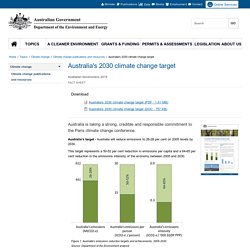
Australia’s target - Australia will reduce emissions to 26-28 per cent on 2005 levels by 2030. This target represents a 50-52 per cent reduction in emissions per capita and a 64-65 per cent reduction in the emissions intensity of the economy between 2005 and 2030. Figure 1. Australia’s emissions reduction targets and achievements, 2005-2030. National climate resilience and adaptation strategy. Climate change strategy2009. Bangladesh rated world's most vulnerable country to climate change. A third of global economic output worth $44 trillion is likely to face ‘high’ or ‘extreme’ risk as a result of global warming Bangladesh is set to suffer more from climate change by 2025 than any other country, warns a new report by risk analysts Maplecroft.
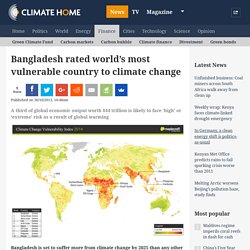
It says rising sea levels, severe storms and other extreme climate-related events will also threaten the future of the country’s capital Dhaka, along with Mumbai, Manila, Kolkata and Bangkok. Maplecroft’s 2013 Climate Change and Environmental Risk Atlas reveals that 31% of global economic output worth $44 trillion is likely to face ‘high’ or ‘extreme’ risk as a result of global warming. “With global brands investing heavily in vulnerable growth markets to take advantage of the spending power of rising middle class populations, we are seeing increasing business exposure to extreme climate related events on multiple levels, including their operations, supply chains and consumer base,” said James Allan, one of the authors. Adapting to a Changing Climate - Melbourne's Story. Technology and wellbeing - Destination Innovation. Trump's likely science adviser calls climate scientists 'glassy-eyed cult'
The man tipped as frontrunner for the role of science adviser to Donald Trump has described climate scientists as “a glassy-eyed cult” in the throes of a form of collective madness.
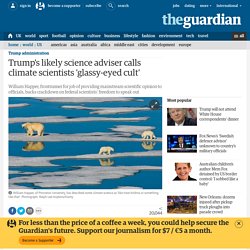
William Happer, an eminent physicist at Princeton University, met Trump last month to discuss the post and says that if he were offered the job he would take it. Happer is highly regarded in the academic community, but many would view his appointment as a further blow to the prospects of concerted international action on climate change. “There’s a whole area of climate so-called science that is really more like a cult,” Happer told the Guardian. “It’s like Hare Krishna or something like that. They’re glassy-eyed and they chant. Trump has previously described global warming as “very expensive … bullshit” and has signalled a continued hardline stance since taking power. m2pdfc3. The Carbon Cycle 3D Animation. Fossil fuel firms are still bankrolling climate denial lobby groups. The oil giant BP has announced that they will no longer fund the American Legislative Exchange Council (Alec), a lobbying group that routinely misrepresents climate science to US state legislators.

It is the latest sign that some of the world’s largest fossil fuel companies appear to be warming to the overwhelming evidence that the unabated use of their products poses severe risks of disrupting the climate. Last month, BP and Royal Dutch Shell announced their support for shareholder resolutions calling on them to commit to reduce heat-trapping emissions, invest in renewable energy, and show how their current business model would hold up against the strict limits on future emissions needed to limit the risk of major climate disruption.
Shell chief executive Ben van Buerden recently stated that “climate change is real and a threat we want to act upon. We are not aligning with sceptics.” Giant iceberg poised to break off from Antarctic shelf. A giant iceberg, with an area equivalent to Trinidad and Tobago, is poised to break off from the Antarctic shelf.
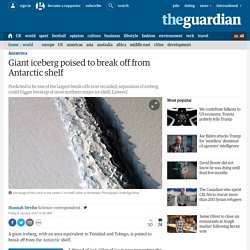
A thread of just 20km of ice is now preventing the 5,000 sq km mass from floating away, following the sudden expansion last month of a rift that has been steadily growing for more than a decade. The iceberg, which is positioned on the most northern major ice shelf in Antarctica, known as Larsen C, is predicted to be one of the largest 10 break-offs ever recorded. Professor Adrian Luckman, a scientist at Swansea University and leader of the UK’s Midas project, said in a statement: “After a few months of steady, incremental advance since the last event, the rift grew suddenly by a further 18km during the second half of December 2016. Only a final 20km of ice now connects an iceberg one quarter the size of Wales to its parent ice shelf.” “If it doesn’t go in the next few months, I’ll be amazed,” Luckman told BBC News.
Understanding the Link Between Climate Change and Extreme Weather. On This Page: Changes in Extreme Weather and Climate Events Scientists study many aspects of change in extreme weather and climate events.
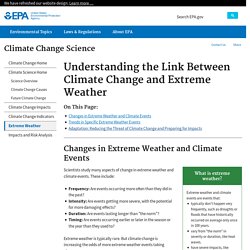
These include: Frequency: Are events occurring more often than they did in the past? Intensity: Are events getting more severe, with the potential for more damaging effects? Extreme weather is typically rare. Establishing the most likely causes behind an extreme weather event can be challenging, since these events are due to combinations of multiple factors, including natural variability. There have been changes in some types of extreme weather events in the United States over the last several decades, including more intense and frequent heat waves, less frequent and intense cold waves, and regional changes in floods, droughts, and wildfires.[1] This rise in extreme weather events fits a pattern you can expect with a warming planet. Five-year global temperature anomalies from 1880 to 2015. Global Ice Viewer.
Global Ice Viewer. Sea Change. Evidence. The Earth's climate has changed throughout history.
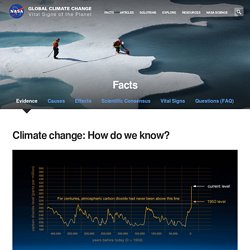
Just in the last 650,000 years there have been seven cycles of glacial advance and retreat, with the abrupt end of the last ice age about 7,000 years ago marking the beginning of the modern climate era — and of human civilization. Antarctica’s Larsen B Ice Shelf: The Final Act. CO2 sinks - Oceans. Carbon dioxide readily dissolves in water and the oceans provide a huge reservoir of carbon.
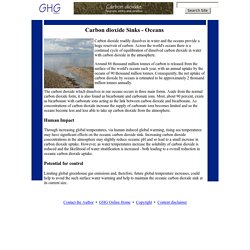
Across the world's oceans there is a continual cycle of equilibration of dissolved carbon dioxide in water with carbon dioxide in the atmosphere. Around 88 thousand million tonnes of carbon is released from the surface of the world's oceans each year, with an annual uptake by the oceans of 90 thousand million tonnes. Consequently, the net uptake of carbon dioxide by oceans is estimated to be approximately 2 thousand million tonnes annually.
The carbon dioxide which dissolves in our oceans occurs in three main forms. The Ocean: A Driving Force for Weather and Climate. Climate Change & the Global Conveyor Belt. Animation. Earth warming to climate tipping point, warns study. Image copyright AP A warmer world will release vast volumes of carbon into the atmosphere, potentially triggering dangerous climate change, scientists warn. Login. 'It was too hot, even to leave home': stories from the world's hottest year. Nigeria In the displacement camps of north-east Nigeria, most residents have the same answer for why 2.6 million people have been forced from their homes in this region. They are running from Boko Haram, the jihadist militants who still control significant parts of the Lake Chad basin. But ask about how Boko Haram gained momentum in the first place, and a more complex narrative emerges.
The extremists capitalised on high levels of local poverty, alienation and unemployment in north-east Nigeria. And that in turn, many local residents argue, was fuelled – in part – by the shrinking of Lake Chad, and the desertification of the surrounding area. “It’s affected our livelihood, it’s affected farming and fishing,” says Mustapha Ali, a 50-year-old who grew up close to the lake’s former shores, and who is now living in a camp for internally displaced people.
What is climate change? Media playback is unsupported on your device BBC News looks at what we know and don't know about the Earth's changing climate. 2016 'very likely' to be world's warmest year. Image copyright Getty Images 2016 looks poised to be the warmest year on record globally, according to preliminary data.
With data from just the first nine months, scientists are 90% certain that 2016 will pass the mark set by 2015. Temperatures from January to September were 1.2C above pre-industrial levels, according to the World Meteorological Organization (WMO). The body says temperatures should remain high enough for the rest of the year to break the previous record.
El Nino has had an impact, but the most significant factor driving temperatures up continues to be CO2 emissions. 2016 locked into being hottest year on record, Nasa says. Nasa has all but declared this year to be the hottest yet recorded, after September narrowly turned out the warmest in modern temperature monitoring. Last month was 0.91C above the average temperature for that time of year from 1951 to 1980, the benchmark used for measuring rises. The new findings follow record-breaking monthly anomalies throughout this year, leading the agency to believe that because of the highs reported so far, 2016 will take the crown as warmest in the 136 years of modern data-keeping. Dr Gavin Schmidt, director of Nasa’s Goddard Institute for Space Studies, tweeted: Last month was only just over the previous record, coming in at a razor-thin 0.004C above the previous high for the time of year, reached in September 2014.
That tiny margin may be revised in future, as monthly temperature data can be nudged up or down retrospectively as later reports come in. But it makes the trend for the year, and the long-term decadal trends, easier to discern. Ethiopia May Paradoxically Benefit From Climate Change. Suffering from corruption, poor sanitation, malnutrition, and enormous economic inequality, Ethiopia is a troubled nation to say the least. However, a new study reveals that it may be getting a welcome boost from a most unlikely source – climate change. Mapping the Impacts of Climate Change. Young People's Trust For the Environment. Many, many species of plants and animals are likely to be affected by climate change. Global Warming Simulation, Global Warming Interactive, Climate Change Interactive. Global Warming Effects Map - Effects of Global Warming. Climate change explained in six graphics. Slow-motion wrecks: how thawing permafrost is destroying Arctic cities.
At first, Yury Scherbakov thought the cracks appearing in a wall he had installed in his two-room flat were caused by shoddy workmanship. But then other walls started cracking, and then the floor started to incline. “We sat on the couch and could feel it tilt,” says his wife, Nadezhda, as they carry furniture out of the flat. Hurricane Sandy-level flooding is rising so sharply that it could become normal. UK must focus on carbon removal to meet Paris goals, climate advisers urge.
Climate change: global deal reached to limit use of hydrofluorocarbons. Global sea levels are rising fast, so where does that leave the cities most at risk? Current projections of global average sea level rise are now expected to double by 2100, which would be severely damaging – if not disastrous – for many of the world’s coastal cities, from Ho Chi Minh City and Mumbai to New Orleans and Miami. Yet the upcoming United Nations conference on sustainable urban development, Habitat III, is unlikely to create the international platform needed to tackle such a global threat, according to Dan Lewis, head of UN Habitat’s urban risk reduction unit.
The Ghanaian villages destroyed by climate change – in pictures. Unnatural Climates. Whether anthropogenic climate change began over 8,000 years ago or within the last few centuries, our inadvertent experiment in climate geoengineering is now not only discernible in its effects, but is also providing major challenges for ourselves and future generations Whatever action we take, from managing greenhouse gas emissions to active solar radiation management, it will have climate consequences. It’s therefore appropriate to ask two fundamental questions related to climate as a context for current and future actions: 1. Nasa: Earth is warming at a pace 'unprecedented in 1,000 years' The planet is warming at a pace not experienced within the past 1,000 years, at least, making it “very unlikely” that the world will stay within a crucial temperature limit agreed by nations just last year, according to Nasa’s top climate scientist.
Climate Time Machine. A global audience joins Prof Michael Sandel to discuss the world's response to climate change. Alaskan village votes on whether to relocate because of climate change. See Before-and-After Photos of the Changing Environment. Professor Brian Cox clashes with Australian climate sceptic. Melting Arctic enables new tourist routes. Scotland's rare mountain plants disappearing as climate warms, botanists find. World's hottest month shows challenges global warming will bring.
Climate scientists make a bold prediction about sea level rise. Early Human Evolution: Climate Change and Human Evoluti. Decline of fishing in Lake Tanganyika 'due to warming'